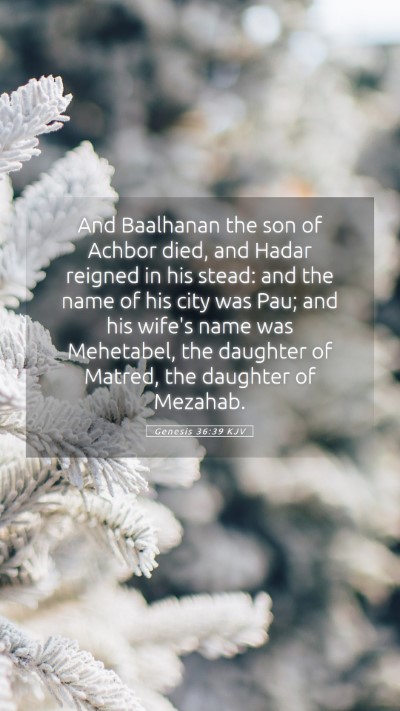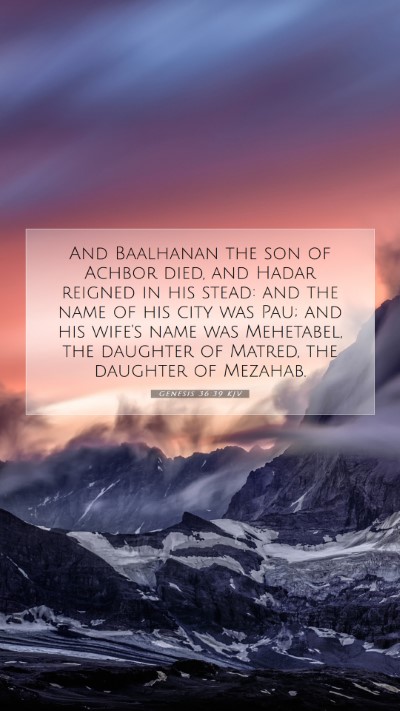Understanding Genesis 36:39: A Comprehensive Bible Verse Commentary
This article aims to provide an in-depth understanding of Genesis 36:39, utilizing insights from renowned public domain commentaries including those by Matthew Henry, Albert Barnes, and Adam Clarke. We will explore the verse's meanings, interpretations, and its significance in biblical context.
Genesis 36:39 - The Text
"And when Baal-Hanan was dead, Hadad the son of Bedad, which smote Midian in the field of Moab, reigned in his stead: and the name of his city was Avith."
Verse Meaning
This verse provides a historical account of leadership transitions in Edom after Baal-Hanan's death. The passage reveals significant aspects such as:
- Succession of Kings: The narrative signifies the succession of leadership in Edom, indicating continuity amidst change.
- Geopolitical Context: The mention of Midian and Moab highlights the geopolitical landscape of the region during this period.
- Significance of Names: Analysis of names like Baal-Hanan and Hadad reflects the cultural and religious influences prevalent among the people.
Insights from Commentaries
Matthew Henry's Commentary
Matthew Henry emphasizes the importance of leadership in nations, illustrating how God's providence governs the rise and fall of rulers. He notes that Hadad's victory over Midian signifies divine favor and aligns with God's overall plan for Israel and Edom.
Albert Barnes' Notes
Albert Barnes focuses on the significance of Hadad's reign and his military exploits. The commentary points out that defeating Midian in the Moabite field illustrates Hadad’s strength and the shifting power dynamics in the region. He underscores the transition as part of God's larger narrative, further bringing relevance to the political landscape.
Adam Clarke's Commentary
Adam Clarke provides a detailed examination of the geographical context, noting that the field of Moab plays a critical role in the historical battles and political conflicts of the time. Clarke elaborates on the implications of Hadad's reign, suggesting that Edom's leaders often rose from military conquests, reflecting the tumultuous era they inhabited.
Historical Context of Genesis 36:39
The historical backdrop of Genesis 36 involves the genealogies and transitions of power among the descendants of Esau. Understanding this context clarifies the significance of successive reigns and their implications for Israel’s history. The verse serves as part of a larger narrative illustrating God’s governance through various leaders over time.
Application of the Verse
In modern application, Genesis 36:39 can inform Bible study groups and individuals seeking to understand leadership dynamics from a biblical perspective. The text encourages reflection on God's providence amidst political changes and the importance of godly leadership.
Cross References
Several Bible verses relate closely to Genesis 36:39, enriching the understanding of its content:
- Genesis 25:30-34 - Discusses the lineage of Esau and Jacob.
- Exodus 3:1 - References the significance of Midian.
- 1 Chronicles 1:43-54 - Provides genealogical context for the Edomite kings.
Conclusion
Through careful study and interpretation, Genesis 36:39 offers valuable insights into the nature of leadership, historical context, and divine sovereignty. By examining biblical exegesis from respected commentaries, readers gain a deeper understanding of Scripture and its applications to contemporary life.
SEO Keywords
For those researching Bible verse meanings, the significance and explanations of Genesis 36:39 align with keywords related to biblical study and understanding scripture. This verse can enhance Bible study resources while providing essential tools for engaging in online Bible study.


